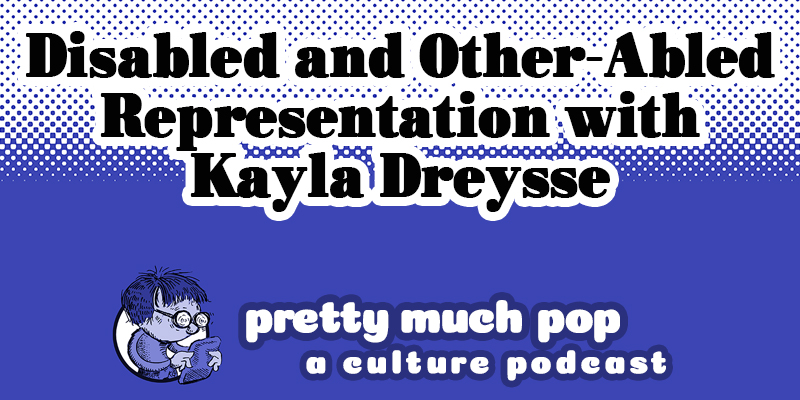
At least 20% of us have some sort of disability, yet such conditions are reflected by only tiny portion of TV and film characterizations, and what characters are portrayed typically get played by non-disabled actors. Depictions often focus on what it’s like to live with the condition. This can of course be socially beneficial, but we don’t want to essentialize people as their conditions, so it’s even more useful to feature disabled actors and characters when the plot is not about their disability.
Pretty Much Pop hosts Mark Linsenmayer, Erica Spyres, and Brian Hirt are joined by playwright Kayla Dryesse to talk about hurdles to representation, disability culture, whether “disability” is even the right word, negative stereotypes (no less than five James Bond villains are in wheelchairs!), and issues in portraying disability related to theater, comedy, horror, and superheroes. Some shows mentioned include Speechless, Atypical, Everything’s Gonna Be Okay, Breaking Bad, Glee, The Stand, The Witches, and The Great British Bake-Off.
Learn more from these articles:
- “Road Map for Inclusion: Changing the Face of Disability in Media” by Judith Heumann
- “Problematic Representation of People with Disabilities in the Media” by Devon McDevitt
- “What Is Disability Culture?” by Steven E. Brown
- “Scary Is How You Act, Not Look, Disability Advocates Tell Filmmakers” by Cara Buckley
- “Deaf Professionals Sign Letter Calling Out ‘The Stand’ for Lack of Inclusion: ‘Enough is enough’” by David Oliver
- “Stepping Backwards with Disability Humor? The Case of NY Gov. David Paterson’s Representation on ‘Saturday Night Live’” by Beth Haller and Amy Becker
- “18 Inspiring Netflix Shows Committed to Representing People With Disabilities” by Corinne Sullivan
- “28 Movies, Books, TV Shows (and More) That Explore Disability Culture” from NY Times
Also, watch Stella Young’s TED talk, called “I’m Not Your Inspiration, Thank You Very Much;” the episode of Drunk History about 504 accessibility; and Stevie Wonder’s SNL parody of a camera commercial.
Hear more of this podcast at prettymuchpop.com. This episode includes bonus discussion that you can access by supporting the podcast at patreon.com/prettymuchpop. This podcast is part of the Partially Examined Life podcast network.
Pretty Much Pop: A Culture Podcast is the first podcast curated by Open Culture. Browse all Pretty Much Pop posts.
Increasing Disabled/Other-Abled Representation in Media — Pretty Much Pop: A Culture Podcast #83 is a post from: Open Culture. Follow us on Facebook, Twitter, and Google Plus, or get our Daily Email. And don't miss our big collections of Free Online Courses, Free Online Movies, Free eBooks, Free Audio Books, Free Foreign Language Lessons, and MOOCs.
from Open Culture https://ift.tt/2Mo4Ucu
via Ilumina
Comments
Post a Comment